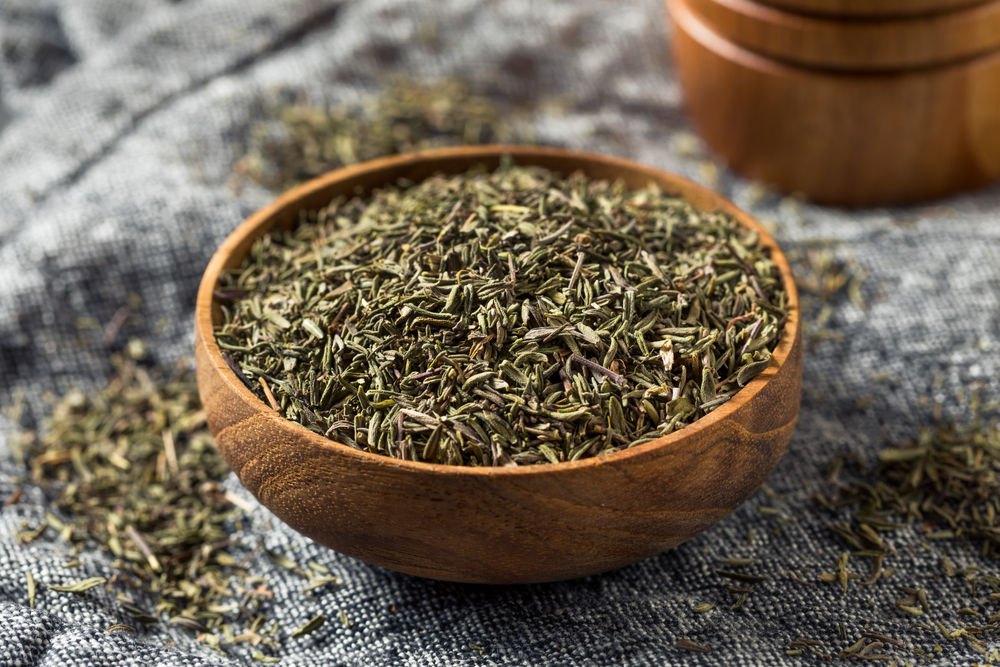Click to Skip Ahead
Thyme (Thymus vulgaris) is a popular spice that many people keep in their homes. You can even grow it in the garden or indoors to have a fresh herb to use in your dishes. Many people wonder if this herb is safe to give your dog, and the short answer is yes. Your dog can eat small portions of thyme and may receive some health benefits from it. However, the primary reason it’s often added to a dog’s diet is for providing some vitamins and minerals; at times, this is necessary to ensure a diet is complete and balanced for dogs.
Keep reading as we look at the potential benefits and precautions needed when this herb is used in a dog’s diet.
Benefits and Uses of Thyme for Dogs
The full extent of the potential benefits of thyme for dogs aren’t completely understood. However, thyme is a popular medicinal herb when it comes to dogs 1. That being said, it’s often used in conjunction with other herbs in experiments and herbal veterinary prescriptions 2. As such, the benefits of thyme should be interpreted cautiously.
It’s important to note that the digestibility of herbs by a dog’s digestive system isn’t comparable to that of a humans, and therefore, the benefits thyme offers to us wouldn’t necessarily be seen in dogs.
Vitamins & Minerals
Thyme’s primary use in diets for dogs is the fact that it can offer a slight improvement in the vitamin and mineral profile of a diet. Cumulatively, thyme offers 10 vitamins and minerals (in varying amounts). However, it’s important to note that the inclusion of thyme isn’t just going to improve the nutritional yield of the diet; depending on the other ingredients, the balance of the diet will change and the yield of some other nutrients will decrease.

Antimicrobial Properties
Thyme oil has been used with some success in a study involving the microbes found in dogs with otitis externa, an inflammation of the outer ear 3. As such, it might have potential benefits against some microbes. That being said, it’s very important to note that the experiment was done in petri dishes in a lab, not on actual dogs. Furthermore, thyme oil wasn’t the sole antimicrobial used in the study. The study also concluded that additional research was necessary to further explore the potential of thyme as an antimicrobial agent.
Flea Control
A study 4 conducted with dogs which attempted to use an herbal product as a flea preventive incorporated thyme extract as one of the ingredients in the herbal product. This study found improvements in the amount of fleas on dogs involved in the experiment. Nonetheless, the product didn’t completely eliminate fleas, and the effectiveness of the herbal product was only seen after a duration of 5 months (after which there were still fleas on the dogs used in the study).
Therefore, if your dog has a flea infestation, relying on herbal remedies will not guarantee immediate results (the dogs in the study showed no benefits for the first 30 days), and such products may not completely eliminate fleas either.

Gastrointestinal Protectant
Prolonged use of NSAIDS (non-steroidal anti inflammatory drugs) can have negative effects on the digestive system of a patient. A study which attempted to find gastrointestinal protectants for dogs found thyme to be a useful herb – however, it was only effective when used in conjunction with other medications investigated in the study 5. In addition, thyme was a part of an herbal product (which contained other herbs too); therefore, to attribute the effect of the protocol solely to thyme wouldn’t be accurate.
This study also highlights the importance of not self-diagnosing and self-medicating a pet. A NSAID should only be administered to your pet on the instructions of a veterinarian, as they have side effects which must be accounted for.
Cancer Preventive
Thyme contains a flavonoid, baicalein, which was found to be somewhat effective at controlling a specific dog cancer (osteosarcoma) cells in one study 5. However, the study was not conducted on live dogs, but rather in petri dishes in a lab. The study also concluded that the exact mechanism by which baicalein helped against cancer needed further investigation. As such, your veterinarian should still be your first point of contact if you suspect that your dog has a sinister medical issue (knock on wood).

Risks of Thyme for Dogs
Though thyme is safe for dogs and seems promising in studies conducted on dogs thus far, it doesn’t mean you should go about adding thyme to your dog’s food without any rhyme or reason, and certainly not without first consulting a veterinary or animal nutritionist. Doing so is considered risky, for several reasons.
- May Throw Off Nutritional Balance – As mentioned earlier, thyme (and in fact, any herb) will “interact” with the other ingredients in your dog’s diet, and it can alter the total yield of certain nutrients. When used inappropriately, it will most likely lead to nutritional deficiencies in the diet.
- Smoke, But No Fire – The current science involving thyme seems to show potential. However, much of the potential benefits of thyme remain unproven and as such, there is a possibility that it might not be as beneficial as one may assume.
- Rejection from Your Pet – Though you may view thyme as beneficial for your dog, your dog might have different ideas. Your dog may simply refuse to eat the food with thyme sprinkled on it. In fact, this is a very important point many people seem to miss; no matter how beneficial an herb is, if your dog doesn’t enjoy it and refuses to eat it, the benefits obviously wouldn’t transfer to your pet. Trying to force feed your pet isn’t advised, as it can lead to issues (both behavioral and medical).
- Digestive Distress – Consumption of thyme for the first time or in large quantities may result in digestive distress for your dog. These often manifest as either diarrhea or vomiting episodes, and unfortunately, it’s possible that your dog may experience both of these undesirable issues simultaneously.
- Digestibility – The digestibility of plant matter in dogs isn’t as efficient as animal matter, especially with regards to protein. As such, dogs wouldn’t derive as much protein from thyme as they would from animal sources.
- Quality vs Quantity – The thyme extracts used in studies involving dogs are often formulated in labs with other herbs and are usually in an entirely different concentration than what is found in natural thyme you would grow or purchase at a grocery store. As such, adding a certain quantity of thyme to your dog’s diet may not necessarily offer them the benefits you think IT would, as it may not even pack the relative qualitative “punch” of a product manufactured in a lab.
The risks associated with thyme are considerable. In fairness though, many of these risks are associated with other herbs too. In essence, the best way to safely incorporate thyme into your dog’s diet is at the discretion of a veterinarian or an animal nutritionist.

Conclusion
Thyme is safe for dogs and may offer them some health benefits. However, many of the benefits of thyme are considered as potential as opposed to definitive right now. The promising studies involving dogs which included thyme in the research model have called for further research, and rarely used thyme as the sole herb in their study methodology.
The inclusion of thyme (or any herb) into a pet’s diet does require the input of a trained professional (a veterinarian or an animal nutritionist), as it isn’t a herb that will offer only benefits; it may, in fact, interact unfavorably with the overall yield of some nutrients in the diet as a whole.
Related Dog Reads:
Featured Image Credit: Brent Hofacker, Shutterstock














